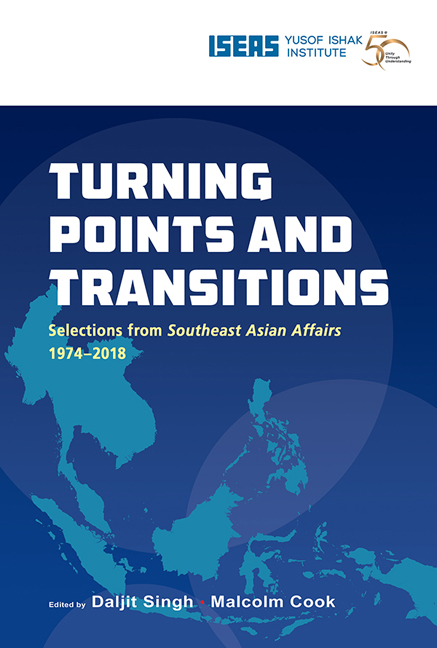Book contents
- Frontmatter
- Contents
- Message from the Director
- Foreword
- Foreword
- Introduction
- THE REGION
- BRUNEI
- CAMBODIA
- INDONESIA
- LAOS
- MALAYSIA
- MYANMAR
- THE PHILIPPINES
- SINGAPORE
- THAILAND
- The Revolutionary Situation in Thailand (1975)
- American Military Withdrawal from Thailand (1976)
- The Thai Economy: From Boom to Gloom? (1997)
- Thailand: A Year of Diminishing Expectations (1999)
- Thailand: A Reckoning with History Begins (2007)
- What Went Wrong with the Thai Democracy? (2015)
- VIETNAM
The Revolutionary Situation in Thailand (1975)
from THAILAND
Published online by Cambridge University Press: 29 May 2019
- Frontmatter
- Contents
- Message from the Director
- Foreword
- Foreword
- Introduction
- THE REGION
- BRUNEI
- CAMBODIA
- INDONESIA
- LAOS
- MALAYSIA
- MYANMAR
- THE PHILIPPINES
- SINGAPORE
- THAILAND
- The Revolutionary Situation in Thailand (1975)
- American Military Withdrawal from Thailand (1976)
- The Thai Economy: From Boom to Gloom? (1997)
- Thailand: A Year of Diminishing Expectations (1999)
- Thailand: A Reckoning with History Begins (2007)
- What Went Wrong with the Thai Democracy? (2015)
- VIETNAM
Summary
Downfall of the Military Régime
In September 1973 one hundred Thai people from many walks of life — university students, farmers, labourers, ex-members of the dissolved elected Parliament, artists, writers, government officials, medical doctors, and professors — signed their names to endorse a statement petitioning the military government for a democratic constitution. On 6 October, some members of this group went about distributing leaflets and copies of their demand for a democratic constitution at a few public spots. Thirteen of them were immediately arrested and charged with illegally holding a political assembly of more than five persons, committing communist acts, and insurrection. On Tuesday 9 October, the second day of the final examinations at Thammasat University, thousands of Thammasat University students walked out of their examinations and forced the university to be closed. They began a vigorous campaign against the military régime and demanded an immediate and unconditional release of all the arrested members of the constitutionalist group, which included students and one professor from Thammasat University. They staged a sit-in on the Thammasat University campus for five consecutive days and nights, taking turns to make continuous anti-government speeches. During the rally, they were joined by nearly 100,000 high school, vocational school, and university students from Bangkok and many provinces. Arriving by bus or on foot, they came equipped with national flags, loudspeakers, placards, and leaflets, some of which they had distributed along the way.
At Thammasat, students were organized into teams of tactical planners, donation collectors, food distributors, speech makers, negotiators, militiamen, as well as bottlebomb makers. At noon on the fourth day of the rally, the National Student Center of Thailand (NSCT), acting on behalf of all students, served an ultimatum to the military government to release the prisoners unconditionally and proclaim a democratic constitution within six months. The ultimatum required that the military government act within twenty-four hours; otherwise, the students would take ultimate action. At 7.00 p.m. the same evening, the government announced that it would release the prisoners on bail and agreed to have a new constitution ready within one year, but the students refused to accept the government's move and continued demonstrating at Thammasat University through the fourth night.
- Type
- Chapter
- Information
- Turning Points and TransitionsSelections from Southeast Asian Affairs 1974-2018, pp. 637 - 643Publisher: ISEAS–Yusof Ishak InstitutePrint publication year: 2018



